Eventuri 2018-2022 Audi TT RS 8S (3rd Gen) Carbon Fiber Cold Air Intake System
Performance Gain (RS3 with Stock Turbo): 15-18hp, 19-23ft-lb
Performance Gain (RS3 with Hybrid Turbo): 25-30hp, 20-24ft-lb
Flow Bench Data: Stock Intake 530 CFM : Eventuri Intake 840 CFM
Fitment: RS3 8V Gen 2 and TTRS 8S including the 2019 OPF DWNA versions.
With the 8V RS3 Gen 2 and TTRS 8S platforms being widely used for high power builds, we have developed a groundbreaking intake system to support even those exceeding the 1000whp mark. This intake system has been developed to offer the highest possible flow rate whilst maintaining the lowest intake temperatures possible. Each component has been designed to provide the turbo with a smooth and free flowing path. The intake tube has an internal diameter of 103mm or just over 4″ and has a smooth curvature from the filter housing all the way to the turbo inlet. The filter itself has been specifically designed for this intake and has a huge outer diameter of 210mm or 8.3″ with a filtration surface area of over 130,000mm^2. The patented Venturi housing has been designed to provide the maximum internal volume possible for the RS3 engine bay space available and provides laminar flow to the turbo tube. Finally the duct seals the filter opening to the front slam panel but is not restricted by just the stock entry feed. We have lifted the front of the duct to now provide an extra opening behind the hood which is equivalent to an extra 7″ diameter hole for the intake to draw from. The resulting system has the capability of flowing 840 CFM at 28″ H2O while keeping intake temperatures at a minimum with the sealed design.
The Eventuri Difference
The 8V RS3/TTRS Eventuri system uses our Patented Carbon fibre Housings which provide an aerodynamically efficient airflow path from the filter to the turbo tubing. Not just another cone filter with a heat shield but a unique design which invokes the Venturi affect.
- EVE-ST38V8S-CF-INT : Audi RS3 Gen 2 / TTRS 8S intake for DAZA and DWNA Engines

The Eventuri RS3 8V / TTRS 8S intake system consists of a number of components engineered to perform a specific purpose and fabricated to the highest of standards. We use 100% pre-preg carbon fiber with no fibreglass which means we can achieve a smooth internal surface to maintain smoother airflow. Here are the details for each component and the design ethos behind them:
Each intake system consists of:
- Carbon Fiber Patented Venturi Filter Housing with 103mm Outlet
- Bespoke High Flow Dry Cone Filter
- Carbon Fiber Inlet Duct
- Carbon Fiber Tube with 103mm ID
- OPF (DWNA) Breather adapter
- Heat Shield with Gold Reflective Backing
- Laser Cut Stainless Steel Brackets
- Silicon Breather Hose
- Silicon Couplers and Reducer

Patented Venturi Filter Housing Assembly

The Stage 3 filter housing comprises of a bespoke high flow filter, aluminium cowl, laser cut brackets and the carbon pod itself. The carbon pod shrouds the reverse mounted filter and smoothly shape the airflow down to the intake tubes. This smooth reduction in cross sectional area invokes the Venturi effect where the airflow accelerates whilst maintaining laminar conditions. It can be thought of as a large velocity stack – below is a diagram to show the comparison between our patented design and a regular intake system. Further details can be read in the Technology page.

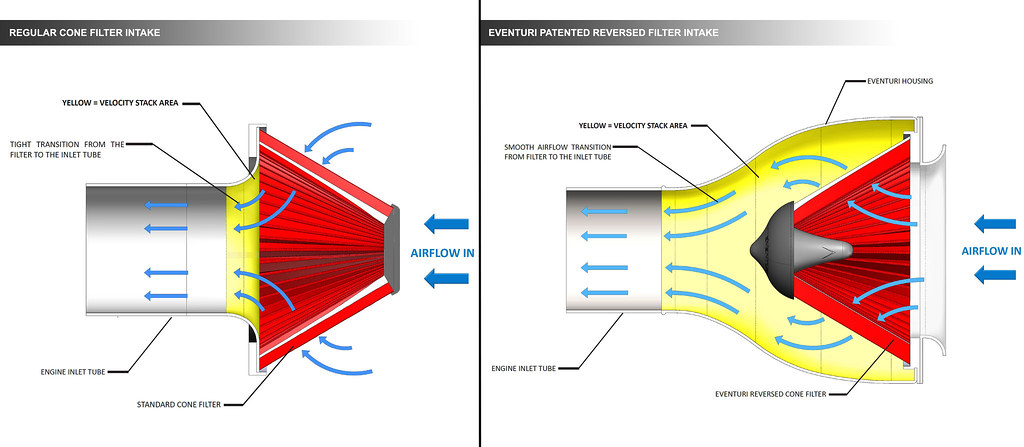
Bespoke Stage 3 Cone Filter
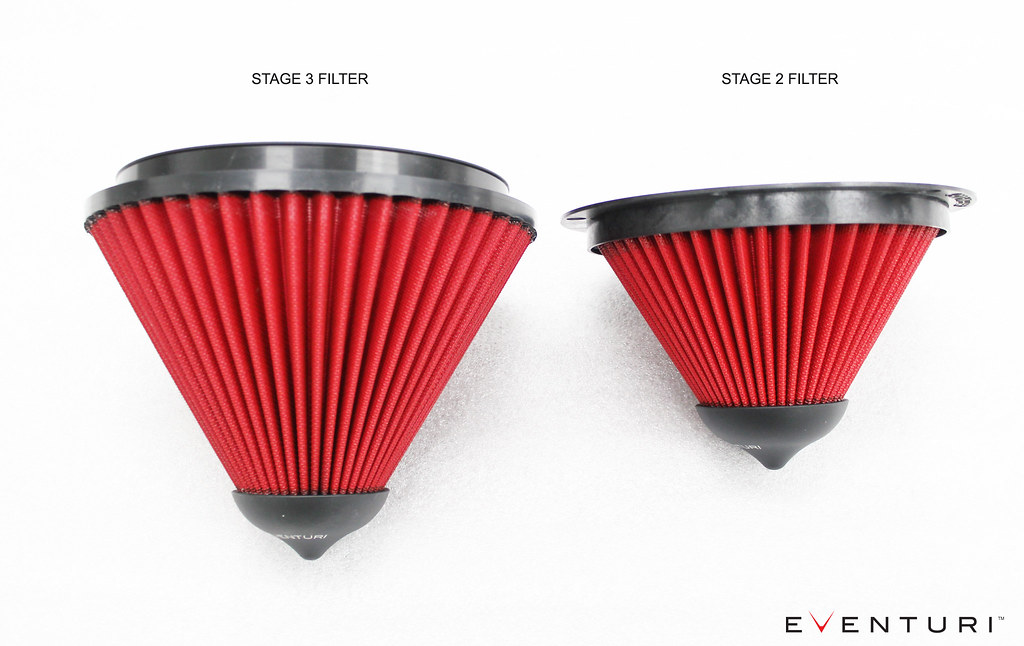
In order to achieve the highest flow rate possible we had to redesign our stage 2 filter and increase the size to as large as was possible withing the RS3 engine bay area. The resulting filter has an outside diameter of 210mm or 8.3″ and when flow tested with just the carbon housing is able to flow up to 940 CFM at 28″ H2O. The filter medium is ISO tested to ensure that filtration is in line with OEM standards and is also dry. The filter is constructed with our signature flow cones to aid in the Venturi housing principle.
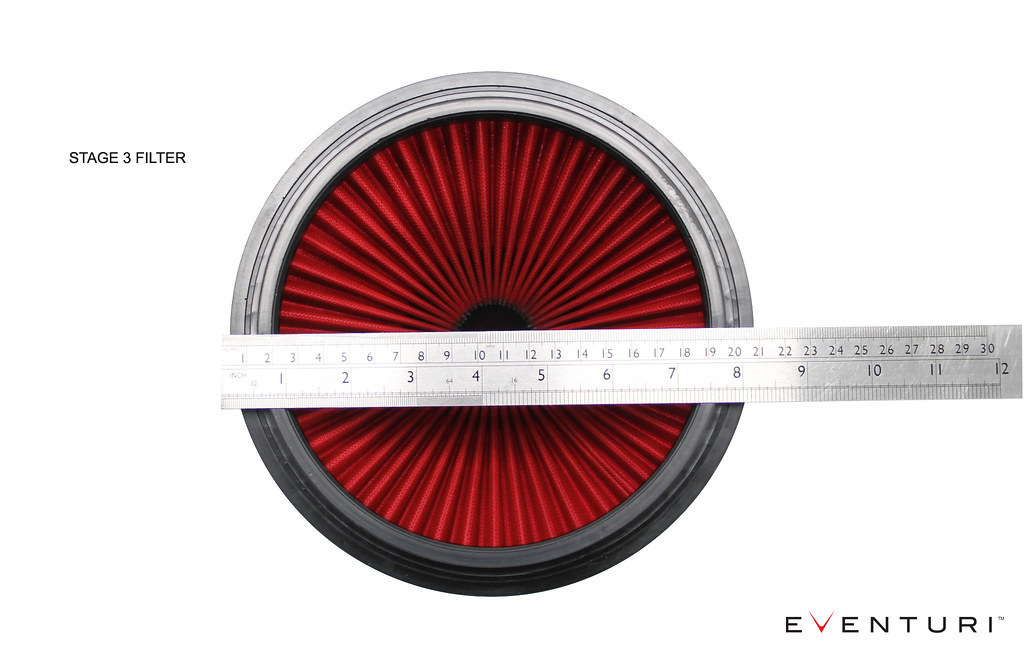
Carbon Fiber Intake Duct

The duct channels ambient air from the slam panel area to the filter housing. It fits inside the OEM ducting system and smoothly transitions to the circular filter housing shape. In order to ensure a good seal against engine bay heat – it also has a flexible rubber edging around the opening which presses against the filter housings creating the desired seal yet allowing the housing to move with the engine. Since this was designed to support high power builds, we found that the stock openings in the slam panel could cause a restriction at high flow demand. So we lifted the top surface of the duct and created an opening above the slam panel which is able to draw in cold air from behind the hood shut. This extra opening is equivalent to a hole with a diameter of over 7″ and completely derestricts the stock cold air feed. The stage 3 duct was designed to have the maximum internal volume possible within the given geometry of the engine bay. This ensures that the filter housing is able to draw with minimum restriction.
We also made sure that the stage 3 duct is compatible with larger aftermarket throttle bodies.

Carbon Fiber Intake Tube

The intake tube is crafted from 100% prepreg carbon fiber and so as mentioned the internal surface is smooth and the carbon weave can be seen. The stage 3 tube has an internal diameter of 103mm or 4″ and has a smoooth curvature to minimise pressure drop. It channels airflow from the Venturi housing to the turbo inlet. The smooth bend geometry ensures laminar flow is maintained from the filters to the exits.

Heat Shield


Due to the intense heat generated by the turbo, we designed a heat shield to protect the carbon tube. The shield is powder coated black but has a gold reflective layer on the base which deflects radiation heat from the turbo and catalyst. It has a stainless steel brace to provide rigidity and curves around the back of the tube to deflect convective heat away. Please note – this shield may not fit some full frame turbo systems with a different exhaust manifold. OPF (DWNA) Adapter

We have 2 separate stage 3 intake systems, one will fit the DAZA engine and the other will fit the new 2019 DWNA engine using an adapter and custom breather hose. Please check your engine to make sure you order the correct intake for your car. Here is the difference between the 2 engines:

Flow Bench Testing
We conducted flow rate tests using a Superflow SF-1020 to measure the maximum flow rate possible at a pressure drop of 28” H2O. Tests were done on the same day in controlled conditions using the same test jig for each system. We tested our full intake system against the stock airbox system. The results show just how restrictive the stock airbox is, which we have managed to improve by up to 58% in maximum possible flow rate. Importantly this has been achieved with a sealed intake system so the intake temperatures will also be maintained at a minimum.
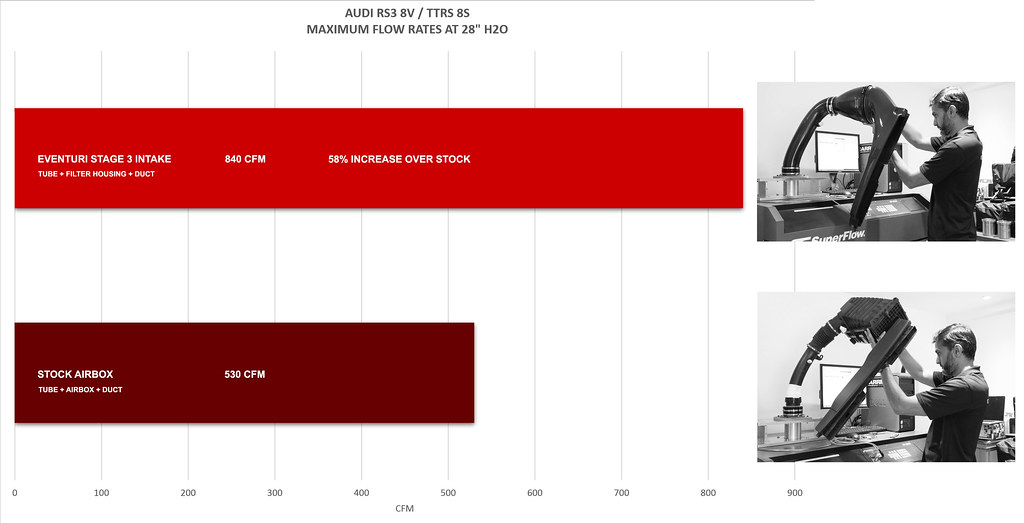
Dyno Testing
Our Stage 3 Intake has been tested by various reputable tuners globally who have been building high powered RS3/TTRS projects for road and track use. The first set of results are from BR Performance Netherlands who tested our system on a TTRS equipped with a TTE700 hybrid turbo. Tests were done on the same day back to back with the hood closed. They tested the stock airbox against our stage 3 intake and also with the addition of our 4″ turbo inlet tube which is an additional product – details can be seen on our Audi products page.
Dyno Results Summary:
- Stock Airbox with Modified Stock Turbo Inlet for TTE700 = 576.5 HP
- Eventuri Stage 3 Intake with Modified Stock Turbo Inlet for TTE700 = 606.5 HP
- Eventuri Stage 3 Intake with Eventuri Turbo Inlet for TTE700 = 620.8 HP

Our stage 3 intake has also been tested on full frame turbo builds pushing the limits of the DAZA engine. Recent tests from Eurocharged Canada used our stage 3 intake to achieve 1010whp which further proves the flow capability of the Eventuri system. During testing, Eurocharged tuners commented that they were able to make more power at a lower boost setting using our stage 3 intake in comparison to other systems they had been using. Their RS3 has already achieved a 9.1 second quarter mile pass with a 160mph terminal speed and are well set to go under 9 seconds soon.
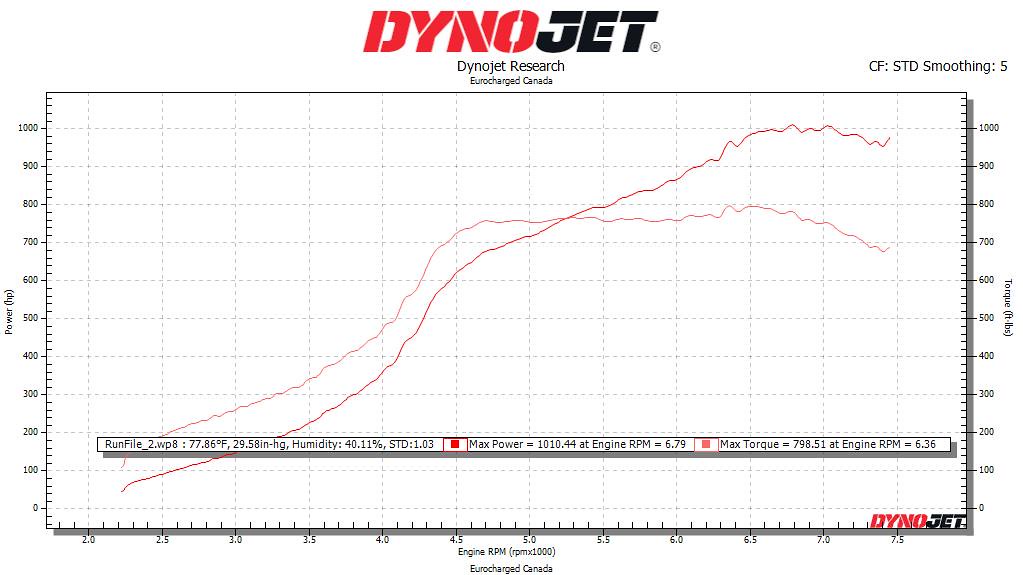
The gains are from a combination of reasons:
1) The sealed system keeps IATs low – the RS3 engine bay can get heat soaked very quickly so an open cone filter will cause an increase in IAT values resulting in a loss of performance.
2) The Venturi housing provides a smooth transition from the filter to the intake tubes which are both matched to an internal diameter of 103mm. This helps the hybrid and full frame turbo setups to run more efficiently.
3) The entire system is constructed from pure pre-preg carbon fibre which is great at insulating from heat and has smooth internal surfaces as opposed to fibreglass which will have sharp resin lines present.


















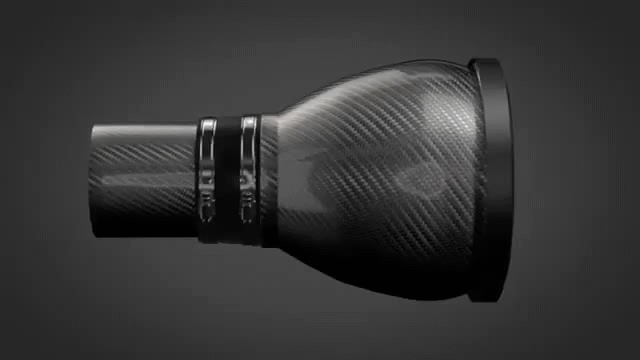
Reviews
There are no reviews yet.